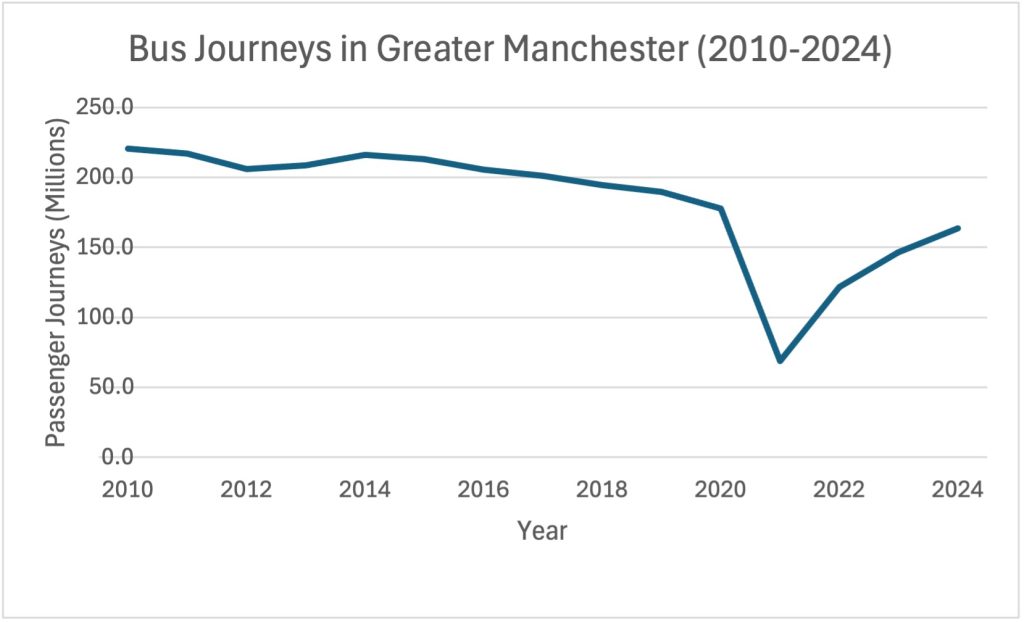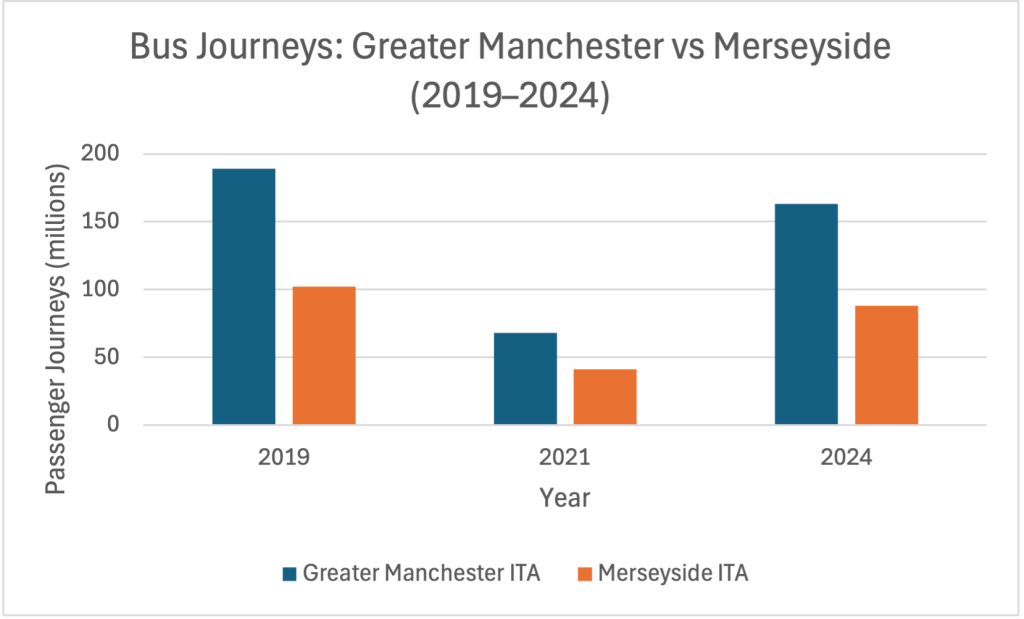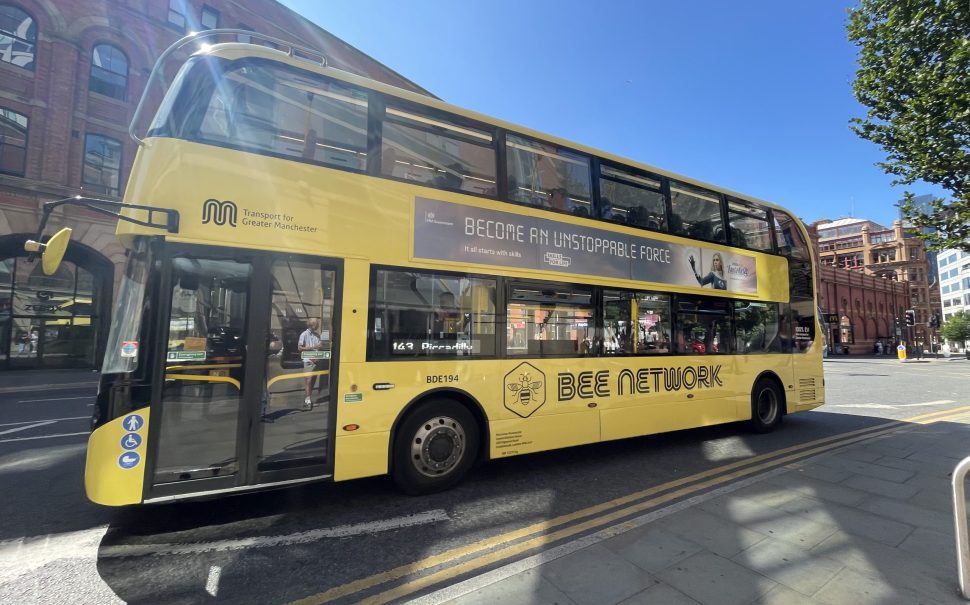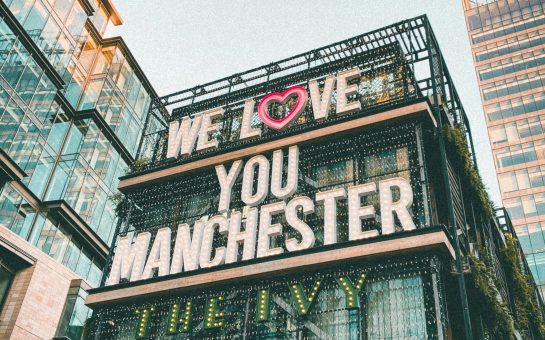The Covid-19 pandemic brought public transport to a standstill and Greater Manchester was no different. With lockdowns, schools closed and many people working from home, bus use significantly declined — dropping from 177 million journeys in 2020 to just 68 million in 2021.
But the network was struggling before Covid – blamed on rising fares and unreliable services – public trust was low. Since then, usage has climbed. In 2021, just 68.9 million journeys were recorded. By 2024, that had risen to 163.5 million, a 137% increase.

Bus journeys in Greater Manchester (2010–2024) Source: Department for Transport
Despite these improvements, journey number remain below the 220 million seen in 2010.
Greater Manchester isn’t alone. Similarly, Merseyside has also seen a recovery. In 2024, they recorded 88.7 million journeys, a recovery of over double from 2021.

The Bee Network, the transport network for Greater Manchester which runs buses, trams and hire bikes, could be one of the reasons for this recovery.
A Bee Network driver from south Manchester, who asked not to be named, said there had been clear improvements since franchising began.
“The price cap has helped a lot of people and, internally, most drivers are happier. It feels more organised now and the whole thing runs better,” they said.
“But we do have a problem. There’s a shortage of drivers. Some are being brought in from other parts of the country and put up in hotels. The issue is, they’re not used to the routes — and some are used to driving in rural areas, not urban ones.”
But despite these issues, for most it is a welcome reorganisation.
Connor Best, 28, from Liverpool, said: “As a visitor, I think the Bee Network is impressive. Trams and buses are well connected, and I’d like to see this approach in other cities.”
He commutes by train into Manchester for work daily, and then uses the Bee Network to get around.
“People who pay council tax, who commute across the city or run businesses, want their money to go back into infrastructure — opening routes, keeping down prices, serving people, not profit.”
He said the Liverpool City Region had been “slow in keeping up” with Manchester.
“Most of our networks are still run by private firms. Fares are being kept low, which is good, but I’d like to see Merseytravel absorb the bus network like TfGM has. Even trams — Liverpool’s been crying out for something better.”
Around 84% of residents now live within a five-minute walk of a half-hourly service.
Fares remain capped at £2 for a single and £5 for a day ticket, with tap-and-go travel recently standardised across buses and trams.
Yamin Abass, 25, grew up in Manchester but moved to London for work and returned home three months ago.
“Since coming back, I’ve been shocked at how popular public transport has become, even among my friends who drive,” he said.
“It’s expensive and difficult to drive into parts of the city, especially the centre, so I think more people are using buses and trams. The £2 cap has helped, but the biggest change for me is the Bee Network app. It lets you plan your route and see exactly when the next bus is coming.”
According to Transport for Greater Manchester, bus journeys have increased by 14 per cent year on year in the first franchised areas.
Punctuality has also improved, with on-time performance rising from 66% before franchising to regularly above 80%.
Niall Griffiths, senior communications officer at TfGM, said: “Our target for Bee Network-operated mileage continues to exceed the pre-franchising services it replaced.”
He added that staffing was the responsibility of individual operators, not the Bee Network.
Transport for Greater Manchester says its approach is now seen as a model for other regions.
The Government’s Better Buses Bill aims to help cities across the UK follow the Bee Network’s example and improve local transport services.
TfGM also points to cleaner vehicles and a stronger safety presence as key success stories, with more than 100 enforcement officers now working across the network.
Vernon Everitt, Greater Manchester’s Transport Commissioner, said the Bee Network was already making a difference.
“Since buses were brought back under local control, there’s been a 14% year-on-year rise in passenger numbers,” he said.
“Buses are more punctual, fares are more affordable, and millions of journeys are now made using ‘tap and go’ payment.
“It’s still early days, but this is a network being run to put people first — and we’re committed to improving it further as Greater Manchester grows.”
Bus use in Greater Manchester is rising fast and the Bee Network has had a big impact on this.
But it is difficult to say whether this will be maintained in the long term.
Greater Manchester has secured £2.5 billion in government funding to expand the Bee Network and create the UK’s first fully integrated zero-emission public transport system by 2030.
The investment will fund new tram lines, electric buses, and other green measures and Mayor Andy Burnham hopes plans will drive green growth, better connecting communities across the region.
Feature image: Bee Network Bus by Haroun Esmail for MM




